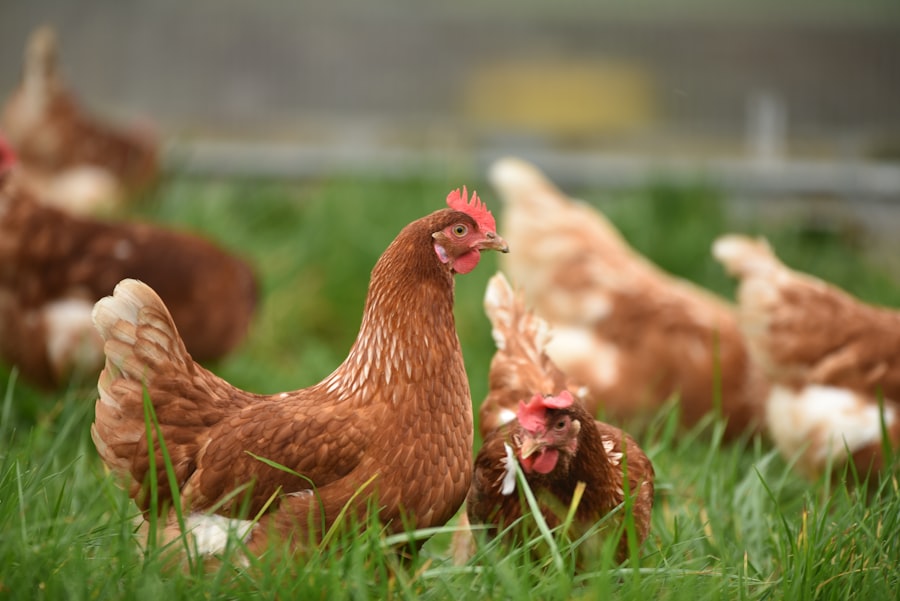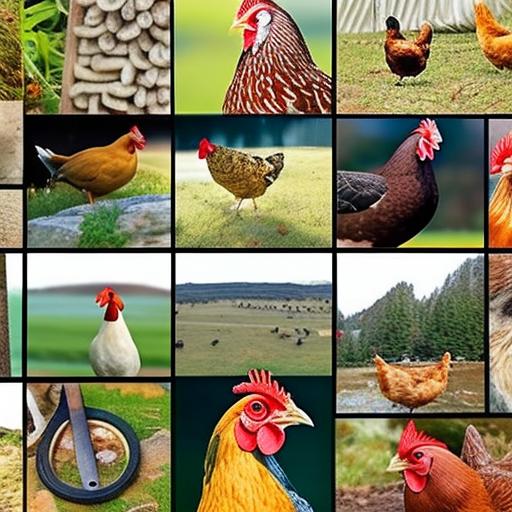Chickens have been domesticated for thousands of years, with the earliest evidence of chicken domestication dating back to around 6000 BC in Southeast Asia. Over time, chickens have become one of the most common and popular livestock animals around the world. People raise chickens for a variety of reasons, including for their eggs, meat, pest control, and companionship.
Key Takeaways
- Raising chickens can be a rewarding and sustainable hobby for individuals and families.
- Keeping chickens can provide a source of fresh eggs, natural pest control, and fertilizer for gardens.
- Choosing the right breed of chicken depends on factors such as climate, egg production, and temperament.
- Preparing a chicken coop involves providing adequate space, ventilation, and nesting boxes.
- Feeding and watering chickens requires a balanced diet and clean water, and maintaining the coop involves regular cleaning and upkeep.
Benefits of Keeping Chickens
One of the main benefits of keeping chickens is the fresh eggs they provide. Not only are fresh eggs delicious, but they are also more nutritious than store-bought eggs. Chickens that are allowed to free-range and eat a varied diet produce eggs that are higher in omega-3 fatty acids and vitamins A and E.
Another benefit of keeping chickens is the fertilizer they provide for gardens. Chicken manure is rich in nitrogen, phosphorus, and potassium, which are essential nutrients for plant growth. By using chicken manure as fertilizer, gardeners can improve soil fertility and increase crop yields.
Chickens also help control pests in the garden. They eat insects such as slugs, snails, and beetles, which can damage plants. By allowing chickens to roam freely in the garden, they can help reduce pest populations naturally without the need for harmful pesticides.
Lastly, chickens can provide companionship. Many people find joy in watching their chickens roam around the yard and interact with each other. Chickens have unique personalities and can be quite entertaining to observe. They can also be trained to come when called and even perform simple tricks.
Choosing the Right Breed
When choosing a breed of chicken, there are several factors to consider. First, consider your purpose for raising chickens. If you primarily want eggs, then you’ll want to choose a breed known for its egg-laying abilities. If you’re interested in meat production, then a meat breed would be more suitable.
Another factor to consider is the climate in which you live. Some breeds are better suited to cold climates, while others thrive in hot climates. It’s important to choose a breed that can tolerate the temperature extremes in your area.
For beginners, there are several popular breeds that are known for being easy to care for and friendly. Some popular beginner breeds include the Rhode Island Red, Plymouth Rock, and Sussex. These breeds are known for their hardiness, good egg production, and docile temperaments.
Preparing the Chicken Coop
Before bringing home chickens, it’s important to have a suitable chicken coop prepared. The size of the coop will depend on the number of chickens you plan to keep. As a general rule of thumb, each chicken should have at least 4 square feet of space inside the coop and 10 square feet of outdoor space.
The location of the coop is also important. It should be placed in an area that is well-drained and protected from strong winds. It should also have access to sunlight for at least part of the day.
When building or buying a chicken coop, there are several materials that you will need. These include wood for the frame and walls, wire mesh for ventilation and predator protection, and roofing material to keep the chickens dry. It’s also important to have a secure door that can be locked at night to protect the chickens from predators.
Inside the coop, you will need nesting boxes for the hens to lay their eggs and roosts for them to sleep on. Nesting boxes should be filled with clean straw or wood shavings to provide a comfortable and clean environment for egg-laying.
Feeding and Watering Chickens
Chickens require a balanced diet to stay healthy and produce eggs. There are several types of feed available for chickens, including pellets, crumbles, and mash. Pellets are a popular choice because they contain all the necessary nutrients in a convenient form. Crumbles and mash are also good options, especially for young chicks.
The amount of feed to give chickens will depend on their age and purpose. Young chicks will need a starter feed that is high in protein to support their growth. As they get older, they can be switched to a grower feed and then a layer feed once they start laying eggs. It’s important to follow the feeding instructions on the feed bag and adjust the amount as needed.
In addition to feed, chickens also need access to fresh water at all times. There are several watering systems available, including traditional waterers and automatic waterers. Traditional waterers should be cleaned and refilled daily to ensure the water is clean and free from contaminants.
Maintaining the Chicken Coop

To keep chickens healthy and productive, it’s important to maintain a clean and sanitary coop. This involves regular cleaning and sanitizing of the coop, as well as proper ventilation and temperature control.
Cleaning the coop involves removing any soiled bedding, such as straw or wood shavings, and replacing it with fresh bedding. The coop should be cleaned at least once a week, or more often if necessary. It’s also important to regularly check for any signs of pests or disease and take appropriate action if needed.
Proper ventilation is essential for maintaining good air quality inside the coop. This can be achieved by having windows or vents that can be opened or closed as needed. Good ventilation helps remove excess moisture and ammonia from the coop, which can lead to respiratory problems in chickens.
Temperature control is also important, especially in extreme weather conditions. Chickens are sensitive to temperature extremes, so it’s important to provide them with a comfortable environment. This can be achieved by insulating the coop in cold weather and providing shade and ventilation in hot weather.
Protecting Chickens from Predators
Chickens are vulnerable to a variety of predators, including raccoons, foxes, and hawks. It’s important to take measures to protect the chickens from these predators to ensure their safety.
One of the most effective ways to protect chickens from predators is to secure the coop and run with wire mesh. The mesh should be buried at least 12 inches deep to prevent predators from digging under it. It should also be tall enough to prevent predators from jumping over it.
In addition to securing the coop, it’s also important to provide a safe outdoor space for the chickens. This can be achieved by using a chicken tractor or electric fencing to create a movable enclosure for the chickens. This allows them to free-range and forage for food while still being protected from predators.
Health and Wellness of Chickens
Keeping chickens healthy is essential for their well-being and productivity. There are several signs of a healthy chicken to look out for, including bright eyes, clean feathers, and a good appetite. Healthy chickens are active and alert, with no signs of illness or injury.
However, chickens can still experience health issues from time to time. Some common health issues in chickens include respiratory infections, parasites, and egg-laying problems. It’s important to monitor the health of your chickens regularly and take action if you notice any signs of illness or distress.
Preventative measures can also be taken to keep chickens healthy. This includes providing a clean and sanitary environment, feeding a balanced diet, and practicing good biosecurity measures. Regular veterinary check-ups can also help identify any potential health issues before they become serious.
Collecting and Using Eggs
Once your hens start laying eggs, it’s important to collect them regularly to ensure their freshness and quality. Most hens will lay one egg per day, so it’s best to check the nesting boxes at least once a day.
When collecting eggs, it’s important to handle them with care to avoid cracking or damaging the shells. It’s best to collect eggs in a clean container and store them in a cool place until they are ready to be used.
Eggs can be used in a variety of ways, from simple scrambled eggs to more elaborate dishes such as quiches and cakes. They can also be preserved by pickling or freezing for later use. Eggs are a versatile ingredient that can be used in both sweet and savory recipes.
Troubleshooting Common Chicken Issues
While raising chickens can be a rewarding experience, it’s not without its challenges. There are several common issues that chicken owners may encounter, including egg-laying problems, aggression towards other chickens, molting, and illnesses.
Egg-laying problems can occur for a variety of reasons, including stress, poor nutrition, or age. If a hen stops laying eggs or lays fewer eggs than usual, it’s important to investigate the cause and take appropriate action. This may involve adjusting the diet, providing additional nesting boxes, or seeking veterinary advice.
Aggression towards other chickens is another common issue that can occur in a flock. This can be caused by overcrowding, dominance disputes, or territorial behavior. It’s important to provide enough space for the chickens and monitor their behavior closely to prevent injuries.
Molting is a natural process in which chickens shed their old feathers and grow new ones. During this time, chickens may appear scruffy and stop laying eggs temporarily. It’s important to provide extra protein and nutrients during molting to support feather growth and overall health.
Lastly, chickens can experience various illnesses and diseases, including respiratory infections, parasites, and nutritional deficiencies. It’s important to monitor the health of your chickens regularly and seek veterinary advice if you notice any signs of illness or distress.
Raising chickens can be a rewarding and fulfilling experience. Not only do they provide fresh eggs, fertilizer for gardens, and pest control, but they also offer companionship and entertainment. By choosing the right breed, preparing a suitable coop, and providing proper care and nutrition, you can enjoy the benefits of raising chickens.
If you’re considering raising chickens, there are many resources available to help you get started. Books, online forums, and local agricultural extension offices can provide valuable information and support. Don’t be afraid to reach out to experienced chicken owners for advice and guidance. With a little time and effort, you can enjoy the many benefits of raising chickens in your own backyard.
If you’re interested in keeping chickens, you’ll definitely want to check out this comprehensive guide on poultrywizard.com. In addition to providing valuable information on the basics of chicken care, such as feeding and housing, the guide also offers helpful tips on various aspects of chicken keeping. One related article that caught my attention is “How to Insulate a Chicken Coop.” This article provides practical advice on how to keep your chickens warm during colder months, ensuring their comfort and well-being. For more insightful articles like this, be sure to explore the poultrywizard.com website.
FAQs
What are the benefits of keeping chickens?
Keeping chickens can provide a source of fresh eggs, fertilizer for gardens, and entertainment. They also help control pests and weeds in the yard.
What do chickens need to be healthy?
Chickens need access to clean water, a balanced diet, shelter from the elements, and protection from predators. They also need space to move around and exercise.
What kind of housing do chickens need?
Chickens need a coop that is dry, well-ventilated, and secure from predators. The coop should also have nesting boxes for laying eggs and perches for roosting at night.
What do chickens eat?
Chickens need a balanced diet that includes protein, carbohydrates, vitamins, and minerals. They can eat commercial chicken feed, as well as fresh fruits and vegetables, grains, and insects.
How often do chickens lay eggs?
The frequency of egg-laying depends on the breed of chicken and their age. Most chickens lay eggs every 1-2 days, but some breeds may lay fewer or more frequently.
How do you care for baby chicks?
Baby chicks need a warm, dry environment with access to clean water and chick starter feed. They also need protection from predators and regular cleaning of their living space.
What are some common health issues for chickens?
Common health issues for chickens include respiratory infections, parasites, and egg-laying problems. Regular cleaning and monitoring of the flock can help prevent and address these issues.
Meet Walter, the feathered-friend fanatic of Florida! Nestled in the sunshine state, Walter struts through life with his feathered companions, clucking his way to happiness. With a coop that’s fancier than a five-star hotel, he’s the Don Juan of the chicken world. When he’s not teaching his hens to do the cha-cha, you’ll find him in a heated debate with his prized rooster, Sir Clucks-a-Lot. Walter’s poultry passion is no yolk; he’s the sunny-side-up guy you never knew you needed in your flock of friends!







